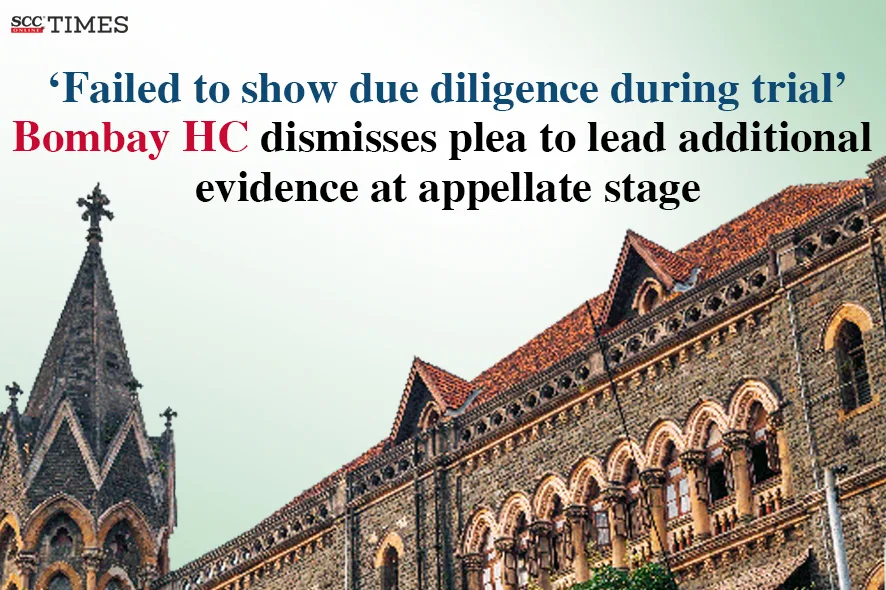Bombay High Court: The present writ petition was filed against the order of the Sessions Court wherein the Court had rejected the petitioner’s application of leading additional evidence. A Single Judge Bench of M.M. Nerlikar, J., held that since the petitioner was part and parcel of the entire criminal proceedings from the inception but had failed to show due diligence during the course of the trial, therefore, he could not be permitted to fill in the lacunae by leading additional evidence at the appellate stage when there was no irregularity in conduct of the trial. Additionally, it was stated that if in such circumstances the petitioner was permitted to fill in the lacunae, it would result in miscarriage of justice. Hence, the Court dismissed the instant writ petition.
Background
The petitioner filed an application before the Judicial Magistrate First Class (Magistrate), under Section 156(3) of the Criminal Procedure Code, 1973 (CrPC), seeking direction to register the First Information Report (FIR) for the offences punishable under Sections 420, 468, 471, 403 and 406 of the Penal Code, 1860 (IPC). Consequently, the Magistrate issued directions under Section 156(3) CrPC, and an FIR was registered against Respondent 2.
The FIR alleged that the petitioner was the Secretary of Pradnya Magasvargiya Gruh Nirman Sahakari Sanstha, Amravati, and Respondent 2 was the President of the said Society. Respondent 2 had sold the plot without taking the consent from the members of the said Society as the sale was made by preparing false and fabricated documents as the plot was allotted to someone else (allottee).
The Police after registering the FIR and conducting the investigation, filed a charge-sheet before the Magistrate for various offences punishable under IPC. Thereafter, charges were framed, and the prosecution led four witnesses including the petitioner. The Magistrate passed the judgment acquitting Respondent 2.
Aggrieved by the order passed by the Magistrate, the petitioner filed an appeal under Section 372 CrPC before the Sessions Court. The petitioner also filed an application under Section 391 CrPC seeking permission to lead additional evidence by examining the allottee as he was not examined during the trial despite being a crucial witness. The Sessions Court rejected the application to lead additional evidence.
Aggrieved by the order of the Sessions Court, the petitioner approached the present Court.
Analysis, Law and Decision
The Court observed that the petitioner’s name was mentioned in the list of witnesses to be examined but the name of the allottee was not present. The petitioner was examined by the prosecution along with other witnesses and after considering all the oral and documentary evidence, the Magistrate acquitted Respondent 2.
The Court noted the observation of the Magistrate which stated that the prosecution failed to examine the allottee despite him being a material witness.
The Court observed that from the initiation of the prosecution, the petitioner was a part of the criminal proceedings but never made any due diligence despite knowing that the allottee was a crucial witness for the case.
The Court also pointed out that the case was pending before the Magistrate for almost 10 years but during that entire period, the petitioner did not make any efforts to examine the allottee. Even the application for leading additional evidence was made after two years of filing the appeal before the Sessions Court.
The Court relied on AjitSinh Chehuji Rathod v. State of Gujarat, (2024) 4 SCC 453, wherein the Supreme Court observed that the power to record additional evidence under Section 391 CrPC should only be exercised when the party making such request was prevented from presenting the evidence in the trial despite due diligence being exercised or that the facts giving rise to such prayer came to light at a later stage during pendency of the appeal and that non-recording of such evidence might lead to failure of justice.
The Court opined that it was a settled principle of law that by leading additional evidence, the lacunae in the trial could not be filled in but the facts of the instant case showed that the petitioner was not diligent in prosecuting the criminal proceedings.
The Court held that since the petitioner was part and parcel of the entire criminal proceedings from the inception but had failed to show due diligence during the course of the trial, thus, the petitioner could be permitted to fill in the lacunae by leading additional evidence at the appellate stage. Additionally, the Court opined that there was no irregularity in the conduct of the trial, nor had the petitioner made out any exceptional case and if in such circumstances, the petitioner was permitted to fill in the lacunae, it would result in miscarriage of justice.
The Court dismissed the petition and held that no case was made out for interference in the order passed by the Sessions Court.
[Dhanraj v. State of Maharashtra, 2025 SCC OnLine Bom 3146, decided on: 9-9-2025]
Advocates who appeared in this case:
Advocate for the Petitioner- U.V. Chakravarty, Advocate
Advocate for the Respondents- S.N. Thakur, A.P.P.




